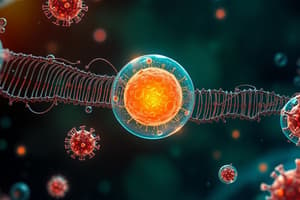Podcast
Questions and Answers
What is the primary focus of cell biology?
What is the primary focus of cell biology?
- Researching environmental ecosystems
- Exploring the genetics of organisms
- Studying the structure, function, and behavior of cells (correct)
- Understanding the behavior of organisms
Which of the following is a key difference between prokaryotic and eukaryotic cells?
Which of the following is a key difference between prokaryotic and eukaryotic cells?
- Eukaryotic cells contain DNA, while prokaryotic cells do not.
- Prokaryotic cells have a nucleus, while eukaryotic cells do not. (correct)
- Prokaryotic cells have a cell membrane, while eukaryotic cells do not.
- Eukaryotic cells have ribosomes, while prokaryotic cells do not.
Which cellular component acts as a selective barrier regulating the movement of substances in and out of the cell?
Which cellular component acts as a selective barrier regulating the movement of substances in and out of the cell?
- Cell membrane (correct)
- Mitochondria
- Cytoplasm
- Nucleus
What do prokaryotic and eukaryotic cells have in common?
What do prokaryotic and eukaryotic cells have in common?
Which cellular process involves the replication of DNA?
Which cellular process involves the replication of DNA?
In which type of cell structure are organelles involved in various cellular processes found?
In which type of cell structure are organelles involved in various cellular processes found?
What is the function of the Golgi apparatus in a cell?
What is the function of the Golgi apparatus in a cell?
Which organelle is known as the powerhouse of the cell?
Which organelle is known as the powerhouse of the cell?
What is the function of lysosomes in a cell?
What is the function of lysosomes in a cell?
Which organelle is responsible for protein synthesis in a cell?
Which organelle is responsible for protein synthesis in a cell?
What is the primary function of the endoplasmic reticulum in a cell?
What is the primary function of the endoplasmic reticulum in a cell?
Which type of membrane proteins span the entire cell membrane?
Which type of membrane proteins span the entire cell membrane?
Study Notes
Cell Biology: The Foundation of Life
Cell biology is a branch of biology that studies the structure, function, and behavior of cells, which are the fundamental units of life. It focuses on understanding the mechanisms behind cellular processes, from DNA replication and protein synthesis to cell division and death. This comprehensive discipline covers both prokaryotic and eukaryotic cell structures and functions, providing essential insights into the complex interactions between cells and their environment. Let's delve deeper into the world of cell biology.
Prokaryotic vs. Eukaryotic Cells
The classification of cells is primarily based on whether they contain a nucleus or not. Prokaryotic cells, such as bacteria, do not contain a nucleus, while eukaryotic cells, found in plants, fungi, animals, and protists, have a membrane-bound nucleus. Despite these differences, both types of cells share common characteristics, such as a cell membrane, cytoplasm, and various organelles involved in various cellular processes.
Cell Membrane: The Gatekeeper of the Cell
The cell membrane, also known as the plasma membrane, is a complex structure that acts as a selective barrier between the cell and its external environment. It regulates the movement of substances in and out of the cell and is essential for maintaining the cell's structure and functionality. The cell membrane is composed of a lipid bilayer with embedded proteins, which can be categorized into two types: integral membrane proteins, which span the entire membrane, and peripheral membrane proteins, which are attached to the lipid bilayer.
Organelles: The Cell's Workforce
Organelles are specialized structures within cells that perform specific functions necessary for cellular processes. Some of the most important organelles in cell biology include:
- Nucleus: The control center of the cell, containing genetic information in the form of DNA.
- Mitochondria: The powerhouse of the cell, responsible for generating energy through cellular respiration.
- Endoplasmic reticulum (ER): A network of tubules involved in protein synthesis, lipid synthesis, and other cellular processes.
- Golgi apparatus: A complex of membrane-bound compartments that modifies, sorts, and packages proteins and lipids for transport to their final destinations.
- Lysosomes: Membrane-bound organelles containing digestive enzymes that break down foreign materials and cellular debris.
- Ribosomes: Large protein-synthesizing complexes that translate genetic information from messenger RNA (mRNA) into proteins.
- Vacuoles: Membrane-bound compartments that store and transport various substances, such as water, nutrients, and waste products.
Cellular Processes and Signaling Pathways
Cell biology also explores the intricate processes that occur within cells, such as:
- Cell division: The process by which a cell splits into two identical daughter cells, ensuring the continuity of life.
- Cell signaling: The communication system that allows cells to respond to external stimuli and coordinate their activities.
- Apoptosis: Programmed cell death, which eliminates damaged or unwanted cells and is essential for development, tissue homeostasis, and immune response.
Research and Education in Cell Biology
Research and education play a crucial role in advancing our understanding of cell biology. Students can participate in undergraduate research programs, summer research opportunities, and paid research assistant positions to gain hands-on experience and contribute to scientific advancements in the field. These experiences often involve working directly with faculty mentors, conducting literature reviews, gathering data, and analyzing information to contribute to ongoing research projects.
In summary, cell biology is a foundational discipline in the field of biology, providing insights into the structure, function, and behavior of cells. By studying cellular processes and organelles, we can gain a deeper understanding of life and its complexities.
Studying That Suits You
Use AI to generate personalized quizzes and flashcards to suit your learning preferences.
Description
Test your knowledge of cell biology fundamentals including cell classification, cell membrane structure, organelle functions, cellular processes, and research in the field. Explore topics such as prokaryotic vs. eukaryotic cells, cell membrane composition, nucleus, mitochondria, endoplasmic reticulum, Golgi apparatus, lysosomes, ribosomes, vacuoles, cell division, cell signaling, apoptosis, and more.




